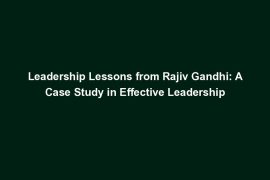Hey there, friends! Today, we’re diving into the fascinating world of nonviolent leadership through the inspiring story of Mahatma Gandhi. You’ve probably heard of Gandhi – the revered leader who played a pivotal role in India’s fight for independence. But did you know that his leadership style was based on the powerful concept of nonviolence?
Gandhi believed in leading with compassion, empathy, and unwavering commitment to truth. These principles formed the foundation of his leadership style, paving the way for positive change in the face of adversity. So, buckle up as we explore the invaluable lessons in nonviolent leadership that Gandhi’s journey has to offer, lessons that are still relevant and applicable in today’s world.
In this first section of our blog post, we’ll take a closer look at Gandhi’s core principles of nonviolent leadership. From his unwavering commitment to truth and honesty to his profound empathy and resilience in the face of challenges, Gandhi’s legacy offers us a treasure trove of wisdom to draw from. Stick around as we unravel the secrets behind Gandhi’s successful leadership style and discover how you can incorporate these timeless lessons into your own leadership journey. Let’s dive in!
Principles of Nonviolent Leadership in Gandhi’s Legacy
Now that we’ve touched on Gandhi’s background and the importance of nonviolent leadership, let’s dive deeper into the specific principles that guided his leadership style. These principles are not just relevant to Gandhi’s time, but they hold valuable lessons that can be applied in various leadership contexts today.
Commitment to truth and honesty
Gandhi was a firm believer in the power of truth and honesty in leadership. He practiced what he preached, always striving to be transparent and authentic in his words and actions. By embodying integrity, Gandhi was able to build trust and credibility among his followers, which ultimately strengthened his leadership.
Think of it this way: just like how a shaky foundation can cause a building to collapse, a lack of honesty and transparency can undermine a leader’s credibility. By staying true to his values and speaking the truth, Gandhi was able to inspire others to follow him on the journey towards independence.
Empathy and compassion towards others
Another key principle of Gandhi’s leadership was his ability to empathize and show compassion towards others. He had a deep understanding of the struggles and challenges faced by the people he led, and he used this empathy to connect with them on a personal level.
Emotional intelligence, or the ability to understand and manage emotions, played a crucial role in Gandhi’s leadership effectiveness. By putting himself in the shoes of others and showing compassion, he was able to forge strong relationships and resolve conflicts peacefully.
Resilience and perseverance in the face of adversity
Gandhi faced numerous obstacles and challenges on the path to independence, but his unwavering determination and resilience never wavered. He understood that meaningful change takes time and effort, and he was willing to persevere through even the toughest times.
Nonviolence, as Gandhi demonstrated, is not a sign of weakness but a strategic tool for achieving long-term goals in leadership. By staying true to his principles and refusing to resort to violence, Gandhi was able to inspire a movement that ultimately led to India’s independence.
Next, let’s explore how Gandhi’s principles of nonviolent leadership can be applied in modern times with real-life examples and practical tips. Stay tuned!
Application of Gandhi’s Leadership Lessons in Modern Times
Now that we’ve delved into the principles of nonviolent leadership as exemplified by Mahatma Gandhi, let’s explore how these timeless lessons can be applied in our modern world. Gandhi’s legacy transcends time and offers valuable insights that can still be relevant and effective in today’s leadership landscape.
Case Studies of Contemporary Leaders
There are numerous examples of contemporary leaders who have embraced Gandhi’s principles of nonviolent leadership and achieved remarkable results. Take, for instance, the civil rights movement in the United States led by Martin Luther King Jr. His commitment to peaceful resistance and nonviolent protest was inspired by Gandhi’s philosophy and proved to be a powerful force in bringing about social change.
Similarly, Malala Yousafzai, the youngest Nobel Peace Prize laureate, used nonviolent tactics to advocate for girls’ education in Pakistan. By staying true to her principles of compassion and resilience, she was able to mobilize support and bring attention to the cause.
Practical Tips for Incorporating Gandhi’s Leadership Lessons
So, how can we integrate Gandhi’s teachings into our own leadership styles? Here are a few practical tips to get you started:
1. Cultivating Truth: Make honesty and transparency core values in your leadership approach. By being authentic and forthright in your dealings, you can build trust and credibility with your team.
2. Showcasing Empathy: Connect with your team on a personal level and demonstrate empathy towards their perspectives and experiences. This emotional intelligence can foster a sense of unity and understanding within your organization.
3. Fostering Resilience: In the face of challenges and setbacks, channel Gandhi’s unwavering resolve and perseverance. Embrace nonviolence as a strategic tool for achieving long-term goals and maintaining composure in times of conflict.
By incorporating these principles into your leadership style, you can not only inspire positive change but also cultivate a culture of compassion, integrity, and resilience within your team or community.
Conclusion
As we wrap up our exploration of Gandhi’s legacy of nonviolent leadership, remember that the impact of these principles extends far beyond one man’s extraordinary life. The values of truth, empathy, and resilience have the power to transform individuals and societies, igniting positive change and sustainable solutions.
I urge you to reflect on Gandhi’s teachings and consider how you can incorporate them into your own leadership journey. Whether you’re leading a team, a community, or simply striving to make a difference in the world, the lessons of nonviolent leadership are as relevant today as they were during Gandhi’s time.
Embrace the spirit of nonviolence, embody the principles of truth and compassion, and let Gandhi’s legacy guide you towards a brighter, more harmonious future.



